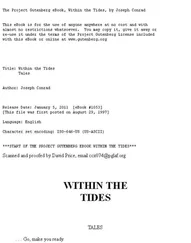“Command you?” she breathed, after a time, in a bewildered tone. “Who are you?” she asked a little louder.
“I am staying in this hotel for a few days. I just dropped in casually here. This outrage—”
“Don’t you try to interfere,” she said so earnestly that Heyst asked, in his faintly playful tone:
“Is it your wish that I should leave you?”
“I haven’t said that,” the girl answered. “She pinched me because I didn’t get down here quick enough—”
“I can’t tell you how indignant I am—” said Heyst. “But since you are down here now,” he went on, with the ease of a man of the world speaking to a young lady in a drawing-room, “hadn’t we better sit down?”
She obeyed his inviting gesture, and they sat down on the nearest chairs. They looked at each other across a little round table with a surprised, open gaze, self-consciousness growing on them so slowly that it was a long time before they averted their eyes; and very soon they met again, temporarily, only to rebound, as it were. At last they steadied in contact, but by that time, say some fifteen minutes from the moment when they sat down, the “interval” came to an end.
So much for their eyes. As to the conversation, it had been perfectly insignificant because naturally they had nothing to say to each other. Heyst had been interested by the girl’s physiognomy. Its expression was neither simple nor yet very clear. It was not distinguished—that could not be expected—but the features had more fineness than those of any other feminine countenance he had ever had the opportunity to observe so closely. There was in it something indefinably audacious and infinitely miserable—because the temperament and the existence of that girl were reflected in it. But her voice! It seduced Heyst by its amazing quality. It was a voice fit to utter the most exquisite things, a voice which would have made silly chatter supportable and the roughest talk fascinating. Heyst drank in its charm as one listens to the tone of some instrument without heeding the tune.
“Do you sing as well as play?” he asked her abruptly.
“Never sang a note in my life,” she said, obviously surprised by the irrelevant question; for they had not been discoursing of sweet sounds. She was clearly unaware of her voice. “I don’t remember that I ever had much reason to sing since I was little,” she added.
That inelegant phrase, by the mere vibrating, warm nobility of the sound, found its way into Heyst’s heart. His mind, cool, alert, watched it sink there with a sort of vague concern at the absurdity of the occupation, till it rested at the bottom, deep down, where our unexpressed longings lie.
“You are English, of course?” he said.
“What do you think?” she answered in the most charming accents. Then, as if thinking that it was her turn to place a question: “Why do you always smile when you speak?”
It was enough to make anyone look grave, but her good faith was so evident that Heyst recovered himself at once.
“It’s my unfortunate manner—” he said with his delicate, polished playfulness. “Is is very objectionable to you?”
She was very serious.
“No. I only noticed it. I haven’t come across so many pleasant people as all that, in my life.”
“It’s certain that this woman who plays the piano is infinitely more disagreeable than any cannibal I have ever had to do with.”
“I believe you!” She shuddered. “How did you come to have anything to do with cannibals?”
“It would be too long a tale,” said Heyst with a faint smile. Heyst’s smiles were rather melancholy, and accorded badly with his great moustaches, under which his mere playfulness lurked as comfortable as a shy bird in its native thicket. “Much too long. How did you get amongst this lot here?”
“Bad luck,” she answered briefly.
“No doubt, no doubt,” Heyst assented with slight nods. Then, still indignant at the pinch which he had divined rather than actually seen inflicted: “I say, couldn’t you defend yourself somehow?”
She had risen already. The ladies of the orchestra were slowly regaining their places. Some were already seated, idle stony-eyed, before the music-stands. Heyst was standing up, too.
“They are too many for me,” she said.
These few words came out of the common experience of mankind; yet by virtue of her voice, they thrilled Heyst like a revelation. His feelings were in a state of confusion, but his mind was clear.
“That’s bad. But it isn’t actual ill-usage that this girl is complaining of,” he thought lucidly after she left him.
That was how it began. How it was that it ended, as we know it did end, is not so easy to state precisely. It is very clear that Heyst was not indifferent, I won’t say to the girl, but to the girl’s fate. He was the same man who had plunged after the submerged Morrison whom he hardly knew otherwise than by sight and through the usual gossip of the islands. But this was another sort of plunge altogether, and likely to lead to a very different kind of partnership.
Did he reflect at all? Probably. He was sufficiently reflective. But if he did, it was with insufficient knowledge. For there is no evidence that he paused at any time between the date of that evening and the morning of the flight. Truth to say, Heyst was not one of those men who pause much. Those dreamy spectators of the world’s agitation are terrible once the desire to act gets hold of them. They lower their heads and charge a wall with an amazing serenity which nothing but an indisciplined imagination can give.
He was not a fool. I suppose he knew—or at least he felt—where this was leading him. But his complete inexperience gave him the necessary audacity. The girl’s voice was charming when she spoke to him of her miserable past, in simple terms, with a sort of unconscious cynicism inherent in the truth of the ugly conditions of poverty. And whether because he was humane or because her voice included all the modulations of pathos, cheerfulness, and courage in its compass, it was not disgust that the tale awakened in him, but the sense of an immense sadness.
On a later evening, during the interval between the two parts of the concert, the girl told Heyst about herself. She was almost a child of the streets. Her father was a musician in the orchestras of small theatres. Her mother ran away from him while she was little, and the landladies of various poor lodging-houses had attended casually to her abandoned childhood. It was never positive starvation and absolute rags, but it was the hopeless grip of poverty all the time. It was her father who taught her to play the violin. It seemed that he used to get drunk sometimes, but without pleasure, and only because he was unable to forget his fugitive wife. After he had a paralytic stroke, falling over with a crash in the well of a music-hall orchestra during the performance, she had joined the Zangiacomo company. He was now in a home for incurables.
“And I am here,” she finished, “with no one to care if I make a hole in the water the next chance I get or not.”
Heyst told her that he thought she could do a little better than that, if it was only a question of getting out of the world. She looked at him with special attention, and with a puzzled expression which gave to her face an air of innocence.
This was during one of the “intervals” between the two parts of the concert. She had come down that time without being incited thereto by a pinch from the awful Zangiacomo woman. It is difficult to suppose that she was seduced by the uncovered intellectual forehead and the long reddish moustaches of her new friend. New is not the right word. She had never had a friend before; and the sensation of this friendliness going out to her was exciting by its novelty alone. Besides, any man who did not resemble Schomberg appeared for that very reason attractive. She was afraid of the hotel-keeper, who, in the daytime, taking advantage of the fact that she lived in the hotel itself, and not in the Pavilion with the other “artists” prowled round her, mute, hungry, portentous behind his great beard, or else assailed her in quiet corners and empty passages with deep, mysterious murmurs from behind, which, not withstanding their clear import, sounded horribly insane somehow.
Читать дальше












